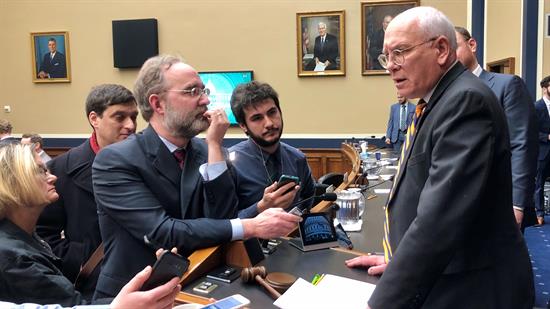- Home
- About
-
Constituent Services
- Academy Nominations
- Community Project Funding
- Congressional Art Competition
- Congressional App Challenge
- Congressional Commendation
- Event Invitation
- Grants
- Help with a Federal Agency
- Internships
- IRA Clean Energy Consumer Benefits
- Know Your Rights: Immigration
- Request a Meeting
- Request Surplus Books
- Presidential Greeting
- Visit Washington D.C.
- Issues & Legislation
- News
- 20th District
- Contact

Press Releases
Tonko Leads Hearing on Response to East Palestine Train DerailmentEnergy & Commerce Subcommittee holds hearing to examine ongoing federal response & remediation efforts
Washington,
March 28, 2023
WASHINGTON, DC—Congressman Paul D. Tonko, Ranking Member of the Subcommittee on Environment, Manufacturing, & Critical Materials, joined a hearing today to review the ongoing response to the Norfolk Southern train derailment in Ohio. Tonko questioned witnesses on efforts to protect public health and the environment and how to ensure transparency and accountability for the residents of East Palestine. Listen to Rep. Tonko’s opening remarks HERE and see below as prepared for delivery. Tonko’s questioning of witnesses can be viewed HERE. (His question’s start about 45 minutes into the hearing) Mr. Chairman, I would like to again offer my support to you and your constituents in East Palestine. I am prepared to work with you to do whatever we must to protect the public health and environment of the community, and to hold Norfolk Southern accountable. I know recovering from a disaster like this will require a long-term commitment, and the community deserves clear and consistent communication about ongoing remediation activities and any remaining risks. Today we will have the opportunity to learn about the government response to the derailment. The U.S. EPA, the Ohio EPA, and the Columbiana County Health District, along with numerous other state and local agencies have played roles in the response effort to date. It is important for us to understand what happened, how intergovernmental coordination has worked, and what lessons can be learned for future incident responses. But we must also remember that Norfolk Southern is responsible for this disaster, not these agencies. And while I believe today’s hearing will be worthwhile because there is much we can learn from the witnesses, I am disappointed that Norfolk Southern is not testifying alongside these government officials. Norfolk Southern is a critical part of the response effort’s unified command and is responsible for carrying out remediation activities. By not hearing the company’s perspective, we are not getting the full picture. So, I hope we can have an additional hearing to examine their role in the response and recovery efforts. We know that successful responses to industrial disasters require cooperation between all levels of government. It is only through a closely coordinated effort that a comprehensive response can be achieved, including communicating risks to affected residents. I know this response was not perfect, and I hope we can learn more about what worked and what failed in order to inform other communities’ preparedness planning. I also know that after the immediate response, there begins a much longer and more difficult remediation effort. After the camera crews are gone, we cannot forget about the people that will continue to live with the fallout from this disaster. But I have no doubt that EPA will continue to enforce the law and conduct oversight of Norfolk Southern’s remediation efforts. And certainly, Congressional oversight of EPA can help keep remediation activities on track, both in East Palestine and in other contaminated sites across the country. Because sadly this situation is not unique. There are hundreds of communities across the country along the fencelines of ports, railyards, power plants, and industrial facilities that may never make the news, but whose residents are often exposed to harmful air, water, and soil pollution that undermines their health and quality of life. Even in my own district, about a decade ago, local residents and first responders became very concerned with the increasing number of trains moving hazardous materials through their neighborhoods. Those were oil trains, but they were shipped in the same inadequate DOT-111 tank cars. Upstate New York has been fortunate to avoid any major incidents. But in a different world, this hearing could have easily been about Albany, or one of those many other communities that must live with the production, shipment, storage, or disposal of hazardous materials in their backyards. And that is why this tragedy is a stark reminder of the critical importance of our nation’s environmental laws. Over the years, I have heard many claims about these laws putting onerous requirements on businesses and stifling economic development. But let’s be clear. These laws exist for a good reason: to protect public health and the environment from polluters that are all too willing to cut corners to increase profits and avoid responsibility. Efforts to erode these laws will only make it harder to hold polluters accountable and prevent similar disasters from occurring in the first place. There can be little doubt that without EPA’s Superfund law, the community and state would still be fighting with the company. While this remediation effort will certainly take time, it is EPA’s oversight and enforcement that will ensure that it occurs in a timely and responsible manner. I know there is much more work to do, and I am fully committed to supporting EPA’s efforts to hold Norfolk Southern accountable and to make the community whole. And I look forward to seeing how this Subcommittee can contribute to that effort.
|
